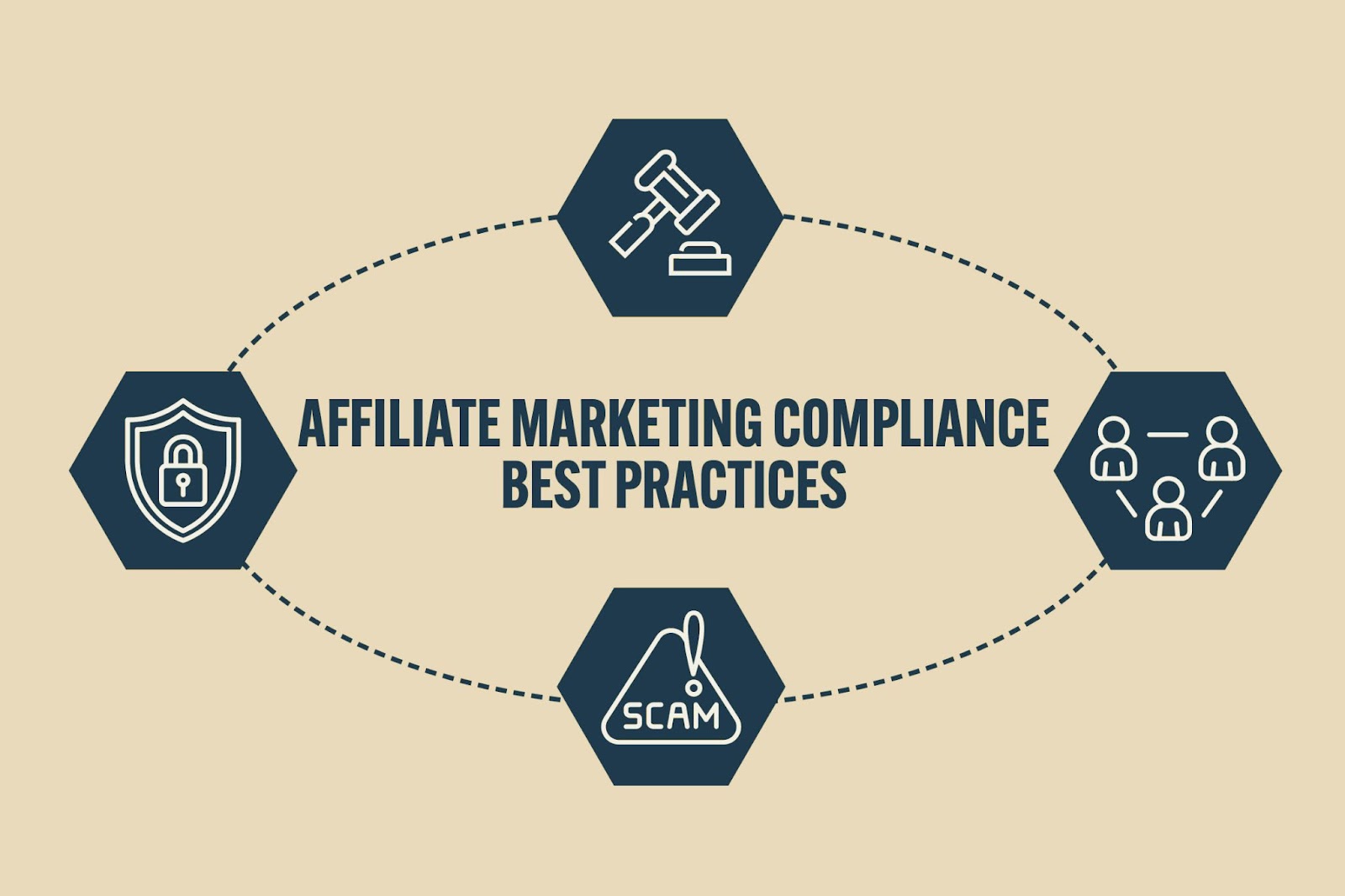Affiliate marketing is big business these days. Over 80% of advertisers use it, and it drives about 16% of e-commerce sales.
But there's a serious issue hiding behind these impressive numbers. A review of 576 social influencers found that 80% failed to disclose paid promotions, which puts brands at significant legal risk. So it's pretty clear that effective compliance in affiliate marketing is more crucial than ever to protect both revenue and reputation. In this report we’ll try to provide what can be done to achieve it.
What is Affiliate Marketing Compliance?
Affiliate marketing compliance means making sure all affiliate-driven promotions follow the law, industry standards, and ethical guidelines. It involves being transparent about paid endorsements, honoring consumer protection laws, and following advertising regulations.
In actual practice, this means affiliates and the brands they promote need to follow rules (like the FTC's truth-in-advertising laws) and program policies so that marketing is honest and fair. Compliance is about meeting regulatory requirements (like disclosure of sponsorships and privacy rules) and business policies designed to maintain trust and integrity in an affiliate program.
Understanding Affiliate Marketing Compliance

Compliance has several important components. Legally, it requires following all relevant regulations — for example, FTC endorsement guidelines in the U.S. that require clear disclosure of affiliate relationships, or data privacy laws governing tracking cookies.
Ethically, it's about transparency and accuracy: no deceptive claims, no hidden sponsorships, no misleading tactics. At its core, affiliate compliance means promoting products in a way that is truthful and clearly identifies any affiliate compensation.
This includes disclosing material connections (like payments or free products), respecting intellectual property and brand guidelines, and avoiding any practices that could mislead consumers. By combining legal mandates with ethical best practices, companies build trust with audiences while keeping their marketing above-board.
Why is Compliance Important in Affiliate Marketing?

Non-compliance isn't a minor issue — it directly affects brand trust and can carry heavy penalties. Consumers tend to trust recommendations from content creators only if they feel those endorsements are genuine. In fact, 69% of consumers trust influencer recommendations more than information straight from brands, so any hint of deception (like a secretly paid promo) can shatter that trust.
From a regulatory standpoint, the stakes are high: regulators can levy steep fines — over $50,000 per violation — for deceptive advertising. Companies have received hundreds of warning letters in recent years, putting them on notice of enforcement.
Beyond fines, non-compliance can invite lawsuits or even a shutdown of business operations. The FTC has shut down schemes that used false claims to lure consumers.
In short, strict compliance is essential to preserve credibility with customers and avoid financial and legal disaster. As one expert put it, having a compliance program is "meant to ensure your brand does not suffer because of preventable misconduct" by affiliates — it protects your reputation, your customers, and your bottom line all at once.
Key Regulatory Bodies that Regulate Affiliate Marketing

Affiliate marketing touches multiple regulatory domains. Here are the key agencies and their oversight areas, along with recent enforcement trends:
FTC (Federal Trade Commission, US)
The FTC polices truth-in-advertising and endorsement disclosures across all industries. Its Endorsement Guides (updated in 2023) explicitly apply to influencers and affiliate marketers, requiring clear disclosure of any material connections.
The FTC has aggressively pursued offenders: for example, it settled with a tea company for $15.2 million after influencers made false health claims and failed to disclose they were paid.
The agency can seek civil penalties (recently raised to $50,120 per violation) for companies and individuals who engage in deceptive affiliate advertising. The FTC also announced a new rule banning fake reviews and testimonials, highlighting its focus on online marketing honesty.
SEC (Securities and Exchange Commission, US)
The SEC regulates advertising of investments and securities. If affiliates promote stocks, crypto tokens, or financial products, they must follow SEC rules.
In one high-profile case, the SEC fined celebrity Kim Kardashian $1.26 million for promoting a crypto security (EthereumMax) on social media without disclosing the $250,000 payment she received.
In 2024, the SEC also fined investment firm Van Eck $1.75 million for failing to disclose that it paid a social media influencer to help launch an ETF (exchange-traded fund). These actions show the SEC will hold brands accountable for affiliates ("finfluencers") who tout investments without proper transparency.
FINRA (Financial Industry Regulatory Authority, US)
FINRA is the self-regulatory body for broker-dealers, and it enforces rules on communications and advertising in the financial sector. FINRA has recently cracked down on "finfluencer" affiliate programs used by brokerage firms.
In March 2024, FINRA issued its first-ever penalty in this area, fining M1 Finance $850,000 for failing to supervise social media influencers it paid to bring in new accounts.
FINRA found the influencers' posts were not fair and balanced and contained misleading claims, violating FINRA Rule 2210 on communications. FINRA has since also settled cases with other firms (e.g., Avenue Securities, fined $300,000 in 2025) for similar issues.
The clear message: financial firms must closely monitor affiliates and ensure compliance with advertising standards or face disciplinary action.
CFPB (Consumer Financial Protection Bureau, US)
The CFPB oversees marketing of consumer financial products (credit cards, loans, banking, etc.), including affiliate and lead-generation practices.
In 2024 the CFPB issued new guidance (Circular 2024-01) warning that "preferencing" — ranking offers based on affiliate payments rather than consumer benefit — is an illegal abusive practice in comparison shopping sites.
This means if a personal finance website or fintech app steers consumers toward a suboptimal credit card or loan because that offer pays the highest affiliate commission, it could violate federal law. The CFPB made it clear that transparency and fairness are required; failure to comply can result in enforcement actions, including fines.
The CFPB often works with the FTC on overlapping issues (for instance, both enforce the "affiliate marketing rule" related to certain consumer data-sharing in financial services). For businesses in the finance space, this underscores the need to ensure affiliate partnerships put consumers' interests first and disclosures are clear.
FCA (Financial Conduct Authority, UK)
The FCA regulates financial promotions in the UK. In 2024, the FCA published new guidance on social media financial promotions, replacing its 2015 guidelines.
The guidance requires that ads — including those by influencers or affiliates — be "fair, clear and not misleading" and include balanced risk disclosures. Notably, the FCA warned that social platforms with character limits (like tweets or stories) might not be appropriate for complex financial products if they can't accommodate required disclaimers.
Firms must ensure any influencers they use are communicating compliantly, and unauthorized finfluencers promoting financial products could be committing a criminal offense.
The FCA has ramped up scrutiny and has stated it "will take action against those touting financial products illegally". In short, UK financial advertisers must get promotions approved by an FCA-authorized entity and include all necessary warnings, even on social media.
ASA (Advertising Standards Authority, UK)
The ASA is the UK's advertising watchdog enforcing the CAP Code (advertising code) for non-broadcast marketing, which covers affiliate marketing and influencer posts.
The ASA has been very active in policing influencer compliance. In late 2024, it upheld five separate complaints against Instagram affiliate ads where the influencers failed to clearly label their posts as ads.
In fact, the ASA updated its explicit guidance on ad disclosure for affiliate marketing in May 2023. The guidance states that if a social post involves a brand an influencer is affiliated with, the entire post falls under the ad rules and must be obviously identifiable as marketing.
The ASA has made it standard that affiliates use a clear label like "#ad" on posts — it even ruled that just saying "#affiliate" isn't sufficient, since many consumers don't understand that term. While the ASA doesn't levy large fines, it can name-and-shame violators publicly and refer repeat offenders to Trading Standards for legal action.
Its strict approach means UK brands need robust processes to ensure every affiliate's post or link is properly disclosed and compliant, or risk damaging rulings.
ESMA (European Securities and Markets Authority) & EU Regulators
Across Europe, authorities are focusing on online promotions, especially for investments. In February 2024, ESMA (along with national regulators in the EU) issued a public warning to finfluencers about the requirements under the Market Abuse Regulation when posting investment recommendations.
They emphasized that transparency and accuracy are key for anyone giving stock or crypto tips on social media. ESMA's guidance says social media posts recommending investments must include certain disclosures: for example, the identity and any conflicts of interest of the person making the recommendation.
If someone is being paid by a company to promote a stock or holds a position in it, that must be clearly disclosed in each post. Failure to comply can lead to administrative or even criminal sanctions in EU member states.
Aside from ESMA, the European Commission's consumer protection authorities have also investigated influencer marketing — a 2023 sweep found 75% of influencers across the EU obscured the fact that their content was advertising in some way. European regulators (like the French AMF and UK's ASA) are collaborating on this issue.
The takeaway is that throughout Europe, whether the context is consumer goods or financial products, there is growing enforcement of transparency in affiliate and influencer marketing.
Enforcement trends
Collectively, these regulators have stepped up enforcement from 2023 onward. Hundreds of warning letters, updated guidelines, and precedent-setting fines/sanctions (many in the six or seven figures) have been issued.
Any brand running an affiliate program internationally must be aware of the patchwork of rules — from FTC disclosure mandates to ASA's #ad rule to ESMA's conflict-of-interest disclosures — and ensure their affiliates comply with all applicable regulations.
How to Ensure Your Affiliate Program is Compliant?

Maintaining compliance requires a proactive, structured approach. Here are several practical steps we can take to keep our affiliate programs on the right side of the law and ethics:
1. Create Detailed Compliance Documentation
Develop a comprehensive affiliate marketing compliance policy or guide and share it with all affiliates. This document should outline content standards and prohibited conduct.
For example, set precise rules for disclosures (exact wording affiliates must use to identify themselves as affiliates) and explicitly ban unethical tactics (like making purchases through their own links, undisclosed self-dealing, etc.).
Many companies also restrict how affiliates can promote — e.g., dictating that affiliates may not bid on certain branded keywords in Google Ads. By clearly stating these rules upfront in writing, you give affiliates a framework to follow and protect your brand from the start.
2. Train Your Affiliates
Don't just hand over a policy; educate your partners about it. When onboarding new affiliates, provide hands-on training or tutorials covering the most important compliance rules.
Explain relevant laws (like what the FTC requires) and show examples of compliant vs. non-compliant behavior. Many programs require affiliates to attest that they have read and understood the compliance guidelines — often this is built into the affiliate agreement sign-off.
Consider webinars, Q&A sessions, or short quizzes to reinforce key points. Well-trained affiliates are far less likely to inadvertently violate rules.
Real-world example: A fintech company, M1 Finance, gave each influencer in its program a "Welcome Guide" detailing how to properly represent its product. Similarly, Avenue Securities provided influencers with written "Conduct Rules" and even example phrases of acceptable claims to use in posts. This kind of guidance can steer affiliates toward compliant practices from day one. Although M1 Finance was still fined by FINRA, because the content produced by their affiliate wasn’t balanced.
3. Regularly Monitor Affiliate Communications
It's crucial to keep an eye on what affiliates are actually saying and doing. Do not let your program run on autopilot. Establish a process to review affiliate marketing materials periodically — especially content from new or high-risk affiliates.
This might include spot-checking blog posts, social media content, YouTube videos, emails, etc., that your affiliates produce, to ensure they have proper disclosures and no false claims. While you may not catch everything in a large program, even manual sampling on a monthly basis can catch obvious issues.
In fact, the FTC expects companies to "routinely monitor and review" affiliate content, and in one settlement it required the business to review affiliates at least monthly on a surprise basis. By actively policing affiliate output, we can catch and correct compliance problems before regulators or the public notice them.
4. Organize and Track Sales Metrics for Anomalies
Your affiliate sales data can be a canary in the coal mine for fraud or non-compliance. Set up systems to monitor key metrics like conversion rates, click-through rates, average order values, chargeback rates, etc., by affiliate.
Unusual patterns might indicate foul play — for instance, an affiliate with an abnormally high conversion rate might be engaging in prohibited tactics (like cookie stuffing or incentive abuse). Some affiliate management platforms allow you to set automated alerts — e.g., flag any affiliate whose conversion rate spikes above a certain threshold or whose average order size is extremely large.
As one affiliate compliance expert notes, you can configure reports so that if an order is above a certain dollar amount or an affiliate's performance deviates dramatically, it triggers a review. By keeping your data organized and using software tools, you can quickly identify and investigate potential non-compliant behavior impacting your bottom line.
5. Enforce Consequences for Violations
Lastly, ensure your program has teeth. Your affiliate terms and conditions should spell out the consequences of breaking the rules, and you must be willing to enforce them, as compliance experts recommend.
This might include issuing warnings or probation for a first minor offense, but serious or repeat violations should result in suspension or termination of the affiliate and possibly forfeiture of unpaid commissions (as a deterrent).
Make it clear that deceptive practices will not be tolerated — for example, state in your policy (as one FTC settlement required) that any affiliate caught engaging in deceptive marketing will be terminated immediately and forfeit all monies owed.
Having a reputation for enforcement will also signal to your entire network that you take compliance seriously. In practice, many brands use a graduated approach: a first violation might prompt a notice and require corrective action within a short timeframe, but subsequent violations lead to automatic removal from the program. Whatever your system, apply it consistently.
By implementing these steps — clear documentation, training, monitoring, data analysis, and strict enforcement — we can significantly reduce the risk of affiliate marketing missteps. Compliance then becomes an integral part of program management, rather than an afterthought.
Final Thoughts: Why Marketing Compliance Matters
The growing complexity of affiliate marketing compliance is something we all need to take seriously. With regulatory bodies becoming more vigilant and penalties reaching into the millions, the risks of non-compliance are too significant to ignore.
What we've seen throughout our research is that effective compliance isn't accidental—it requires a systematic approach with clear documentation, regular training, continuous monitoring, and consistent enforcement. But managing all this manually across hundreds or thousands of affiliate relationships? That's a massive undertaking that can strain even the most diligent marketing and compliance teams.
This is where technology can help. At Luthor, we've developed an AI-based tool that automatically reviews marketing assets for compliance issues. Our system can scan affiliate content at scale to identify missing disclosures, problematic claims, and other compliance risks before they become problems.
By automating the tedious parts of compliance monitoring, we free up your team to focus on strategic work while reducing your exposure to regulatory action and reputation damage. You'll catch more issues earlier, with less effort, and create a more trustworthy affiliate program in the process.
If your team is struggling with the growing complexity of affiliate marketing compliance, we'd love to show you how Luthor can help. Request demo access today to see how we can reduce the risk, effort, and time needed to manage marketing compliance at scale.




